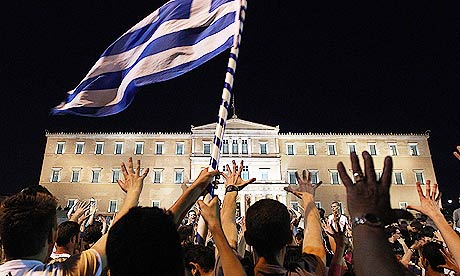This is just peachy ..
"Whether or not American banks are at serious risk from this crisis, the fact is that nearly three years after A.I.G., derivatives are still largely unregulated. The financial reforms that are supposed to improve transparency and reduce speculation — trading derivatives on fully regulated exchanges, strict reporting requirements to regulators and new rules on capital adequacy and business conduct — have yet to be implemented.
The process has been slow in the face of heavy lobbying by the banks. Republican lawmakers are bent on derailing reform by any means necessary, including starving regulatory budgets, impeding the confirmation of regulatory nominees and pressing regulators to adopt light-touch rules. Some Democratic lawmakers and Obama officials are in favor of exemptions on specific derivatives rules that Wall Street opposes."
HI ho (whatever) Silver!!!! Let them run free!




























